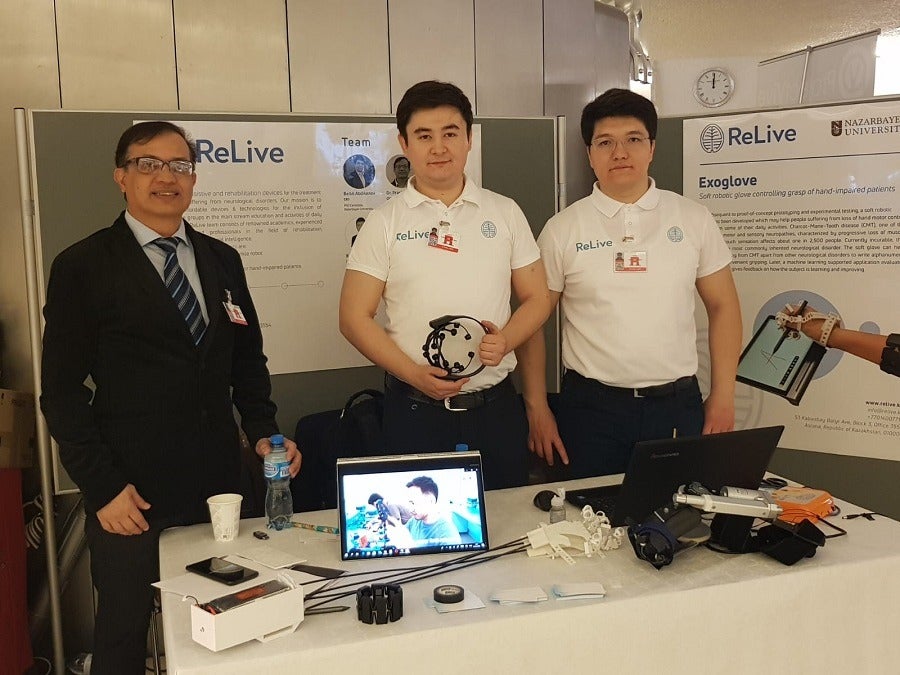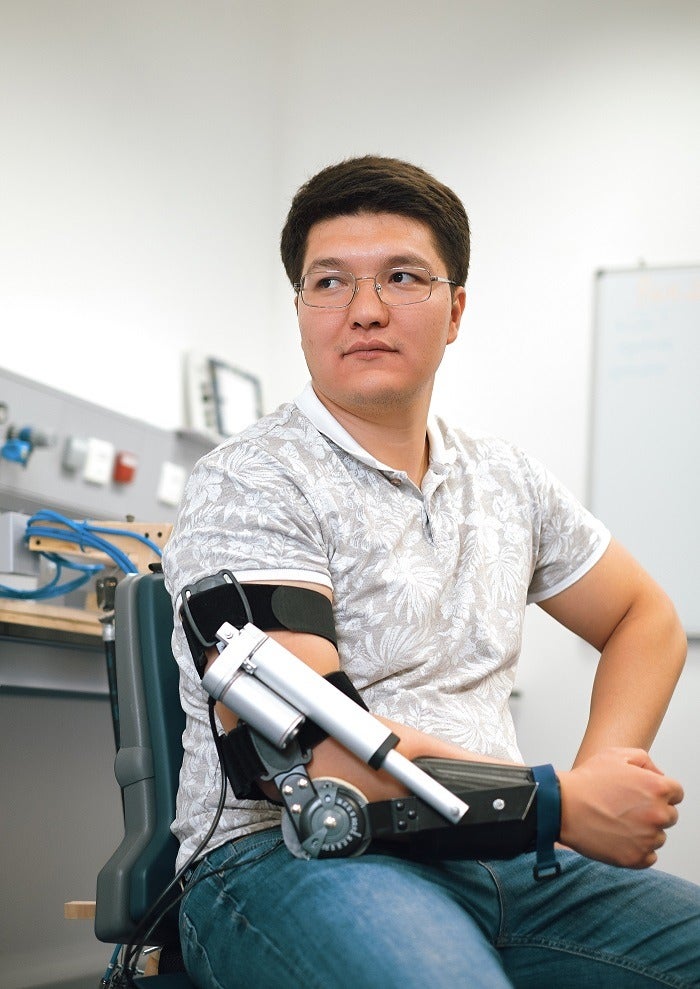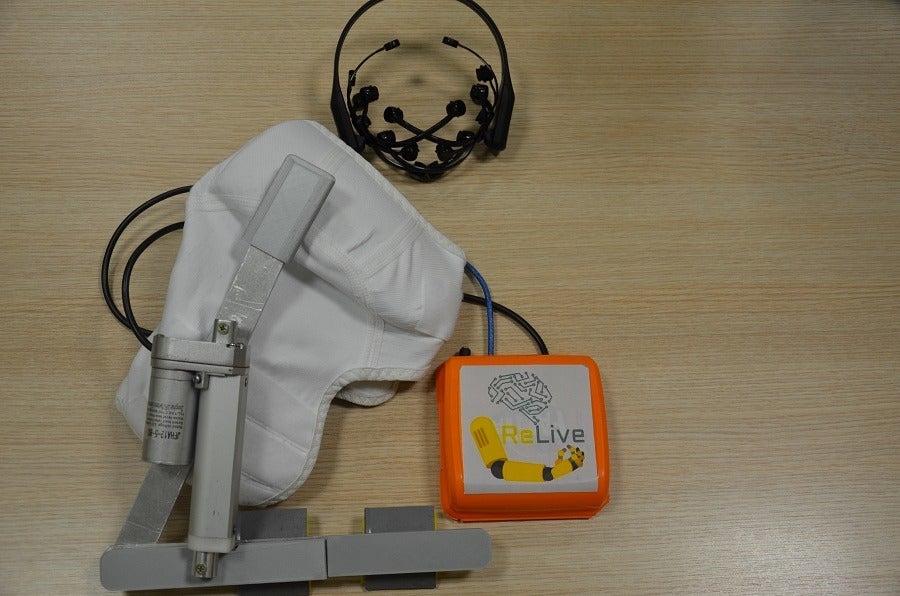
After acknowledging the huge increase in AI and data analysis, Beibit Abdikenov began his studies at Nazarbayev University in Kazakhstan, where ReLive was born. Here CEO Abdikenov tells Anjuman Rahman how the start-up uses software to read and interpret brain signals, which are used to control an exoskeleton of the upper limbs, speeding up stroke patients’ recovery time.
With the UN recognising ReLive as one of the world’s top 20 innovative solutions, the company’s researchers at Nazarbayev University are aiming to achieve accelerated and bespoke rehabilitation of stroke patients through groundbreaking AI-powered software.
After winning accolades and an award from the UN, the start-up was invited to participate in the UNICEF’s Assistive Technology in Accelerating Learning and Participation of Children with Disabilities exhibition earlier this year in March.
Beibit Abdikenov, a PhD student of Nazarbayev University and ReLive CEO, began developing AI software that can read and interpret brain signals, to help change the quality of stroke sufferers’ lives.
He told NS Medical Devices: “Every year around fifty thousand people suffer from strokes. Depending on the intensity of stroke, some people are paralysed partially, others are fully paralysed.
“Rehabilitating those people requires a lot of resources in terms of time and money. Mainly, rehabilitation is an expensive procedure and not many people can afford it in the long term.
“After investigating these issues we started to develop our product.”

How is ReLive different to other neurorehabilitation tech?
Up to 80% of stroke survivors can subsequently experience difficulty using their arms, which can result in a profound loss of independence.
Moreover, it also affects health services that are essential to providing care and rehabilitation in the home.
It is this rehabilitation therapy can be aided by the technological support of robotic-based therapy, non-invasive brain stimulation and neural interfaces.
Kazakhstani start-up ReLive is made up of scientists, researchers and professionals in the field of rehabilitation, mechatronics and AI, and led by the Professor of the school of engineering at Nazarbayev University, Prashant Jamwal.
The team has developed a product that consists of an upper-limb exoskeleton, electroencephalogram (EEG) device — for recording brain activity — and an algorithm to recognise brain signals.
This enables the patient to briefly move their upper limbs using the exoskeleton, which is controlled by their thoughts alone using EEG signals that are registered by the company’s machine-learning algorithm.
All information created during the exercise is recorded using sensors and stored for analysis by a doctor.
Robots for neuro-rehabilitation are designed to support the administration of physical exercises to the upper limbs or legs and ankles, and ReLive’s unique proposition lies in the algorithm installed in its exoskeleton system.
Abdikenov explained: “Traditionally, a patient gets a treatment plan for exercise from a neurologist and is guided by a physiotherapist.
“Also, in many cases, patients do the exercise themselves or with the help of family members at home. During this period, they may perform the exercise incorrectly or get bored.
“In our system, patients will be guided by video, where every exercise will be shown clearly. All actions during the exercises will be captured using sensors for later use by doctors.
“We are also planning to develop the exercise in a game-like environment. We have developed our own assist-as-need intelligence controller, which measures strength in muscles and only assists when required.
“This method is more effective in rehabilitation. Other solutions provide pre-programmed control, which doesn’t consider muscle strength during exercise.
“Also, we have developed our own machine-learning algorithm to control exoskeleton using brain signals. Other, solutions do not provide such feature.”

How having a stroke impacts patients’ long-term future
The World Health Organization estimates that 15 million people suffer strokes worldwide each year.
Of these, five million die and the same number are left permanently disabled.
In the US alone, nearly 800,000 people have a stroke each year, with someone dying every four minutes from the condition, according to the country’s Center for Disease Control and Prevention.
Mr Abdikenov said: “The stroke rehabilitation can continue for three months to two years, depending on the severity of the stroke.
“Therefore, the biggest challenge for stroke suffers is access to affordable rehabilitation.”
Despite some individual success stories, the reality is that many stroke patients struggle to regain the ability to speak, move around and take good care of themselves.
Within three months of having a stroke, patients are often considered to have a chronic condition and the likelihood of further natural recovery is limited – something that is especially true for those most severely affected.
“The percent of patients undergoing rehabilitation is very low in most parts of the world,” added Mr Abdikenov.
“Most rehabilitation centres are located in big cities, which limits access to people who live in rural areas.
“Our idea is to bring affordable rehabilitation to every city, town, small city and village
with the help of technology.”
AI and medical technology advancement in Kazakhstan
The Kazakh government has enforced the Digital Kazakhstan programme, which aims to improve the competitiveness of the country’s economy and quality of life through progressive expansion of the digital ecosystem.
One key area it involves developing is an ecosystem that supports innovative development sites to foster technological entrepreneurship and start-up culture in the country.
This is to attract venture financing and create demand for innovation such as labour automation, robotics, AI, big data exchange, 3D printing and virtual reality.
That development would help drive the economy, improve conditions for business dealings, raise the population’s level of digital literacy and improve the nation’s competitiveness.
“Currently, the Ministry of Healthcare of Republic Kazakhstan are doing very well in
digitalisation of the field,” said Abdikenov.
Although he believes implementing AI has the potential to bring many benefits to the medical sector, he also has concerns regarding data privacy and security issues.
He said: “The amount of data is increasing every day, which will bring a lot of opportunities but also some threats.
“In the future, all information about a human’s health will be connected to one main platform, most of the works will be robotised and experts will consult people with the help of telemedicine.
“Every day consultations will soon utilise artificial medical systems regularly.”
ReLive will be providing their solution in hospitals in Kazakhstan from 2021 and are planning to cover 400-500 hospitals by 2024.
In addition, they are aiming to enter Indian and US markets in the future.






